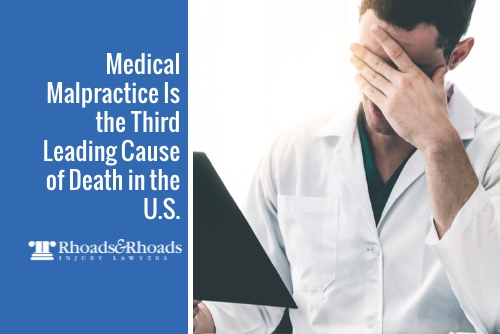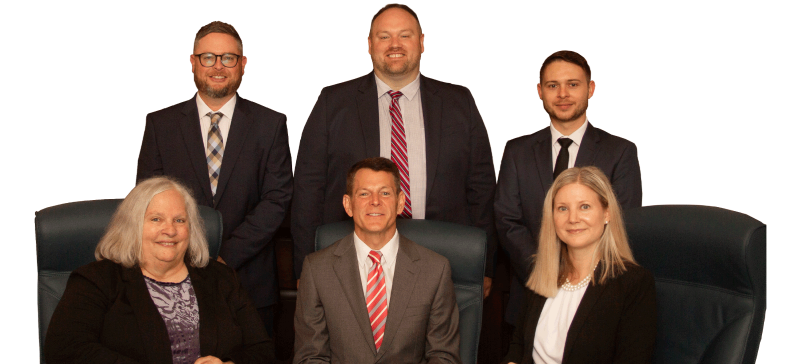
Synopsis
- According to a 2016 Johns Hopkins Medicine comprehensive study on medical errors, negligent lapses in patient care result in 250,000 deaths each year and remain the third leading cause of death in the United States.
- Medical professionals should be held responsible for permanent injuries or fatalities made to patients through surgical errors, missed and delayed diagnosis, medication mistakes, childbirth injuries, and other negligent acts.
- Outside of some special cases, patients have within one year of their medical injury or date of medical negligence discovery to file a medical malpractice case in Kentucky.
- No matter the injury, a medical malpractice lawsuit filed after the statutory deadline has passed will almost certainly be dismissed by the courts leaving victims and their families physically, emotionally and financially drained.
Medical Malpractice Is the Third Leading Cause of Death in the U.S
The latest research on medical malpractice injury rates (2016) comes from Johns Hopkins Hospital and estimates that medical errors result in 250,000 deaths each year in the United States, marking medical malpractice and related negligence as the third leading cause of death, just behind heart disease and cancer.
The most common type of malpractice allegation is an error in diagnosis, followed by errors related to surgery, and errors in association to medication or treatment.
- Misdiagnosis: Missed or delayed diagnoses can cause a patient to endure unnecessary treatments or avoid receiving the right kind of medical help. Misdiagnosis can sometimes lead to an untimely or unexpected death.
- Surgical errors (including anesthesia): These can include mistakes during surgery such as wrong site, wrong procedure, retained surgical instruments left in the body after surgery, anesthesia errors, C-section delivery mistakes leading to maternal and infant injuries, and the use of unclean instruments or tools.
- Medication mistakes: Doctors and pharmacists may provide an improper dosage of a given drug or administer two or more medications that harmfully interact. Improper dosage is typically the most frequently occurring medication error.
The Number of Catastrophic Injury Payments Are Increasing
Medical malpractice lawsuits account for a very small percentage of personal injury litigation. In fact, a May 2017 report published in the Journal of the American Medical Association (JAMA), using the National Practitioner Data Bank (NPDB), showed medical malpractice claims on the decline from 2009 to 2014 by 55 percent, while the percentage of paid claims in catastrophic payments, meaning those exceeding $1 million, increased.
For the increase in claims noted via NPDB, there was a wide difference in rates and characteristics across these specialties, most often involved with:
- Anesthesiology
- Cardiology
- Colon and rectal surgery
- Dermatology
- Emergency medicine
- Family medicine
- Gastroenterology
- General practice
- General surgery
- Internal medicine
- Neurology
- Neurosurgery
- Obstetrics and gynecology
- Ophthalmology
- Orthopedics
- Otolaryngology
- Pathology
- Pediatrics
- Plastic surgery
- Psychiatry
- Pulmonology
- Radiology
- Thoracic surgery
- Urology
Medical malpractice cases can be caused by hospital systems that lack practices in physician accountability, and complicated by doctors and other medical professionals who carry so much more information and resources over a patient. Additionally, some medical errors are representative of overall systemic care problems related to unintegrated hospital systems, technology and communication methods, fragmented insurance networks, and the lack of patient safety nets.
How Long After an Injury Can a Medical Malpractice Claim Be Filed?
If you or a loved one has been a victim of medical malpractice in Kentucky, under the current “statute of limitations” you only have a limited period of time in which you are able to bring a claim against a medical provider.

Any party wishing to bring a medical malpractice case must file the claim within one year after the cause of action accrued or from the date the medical negligence was discovered (or should have been discovered). That is why it is extremely important to get in touch with a medical malpractice attorney as soon as you know you were harmed by a medical error.
The statute of limitation may be extended under the “statute of repose” or if:
- a health care provider has injured a minor;
- or the victim is disabled.
An experienced medical malpractice attorney is the best person to assist an injury victim in evaluating the time passed since the alleged malpractice was committed before the right to file a medical malpractice lawsuit in Kentucky will be lost.
Kentucky Supreme Courts Took on Medical Review Panel Act in 2018
Kentucky legislators passed the Medical Review Panel Act (MRPA) in 2017. The law mandated that no medical malpractice lawsuit can be filed against a health care provider unless the injured patient filed a complaint with a medical review panel, and the panel issued an opinion as to the merits of the complaint.
Many believe the law had restricted or discouraged individuals from making medical malpractice claims. In December of 2018, the Supreme Court of Kentucky, in a unanimous ruling, struck down the medical review panel focused law, stating that the MRPA delays access to the courts, violating Kentucky’s constitution.
Medical malpractice cases, even when sitting in the proof of a physician’s wrongdoing, can be extremely complicated. But that shouldn’t make our expectations to receive quality healthcare overstated, nor our accountability to hold our medical resources high in providing the proper duty of care to us as patients. The attorneys at Rhoads & Rhoads understand this and will fight to ensure you are properly compensated for any abhorrent wrongs done to you.
Owensboro and Madisonville Medical Malpractice Lawyers
With offices in Owensboro and Madisonville, Rhoads & Rhoads represents medical malpractice victims throughout Western Kentucky. We offer free initial consultations, and all cases are taken on a contingency fee basis. We get paid only if we win or settle your case, so there is NO RISK involved.
Call us at 888-709-9329, or contact us by e-mail to schedule an appointment with one of our Madisonville or Owensboro medical malpractice attorneys.
Source: JAMA Intern Med. 2017 May; 177(5): 710–719. Published online 2017 May 1. Prepublished online 2017 Mar 27. doi: 10.1001/jamainternmed.2017.0311


